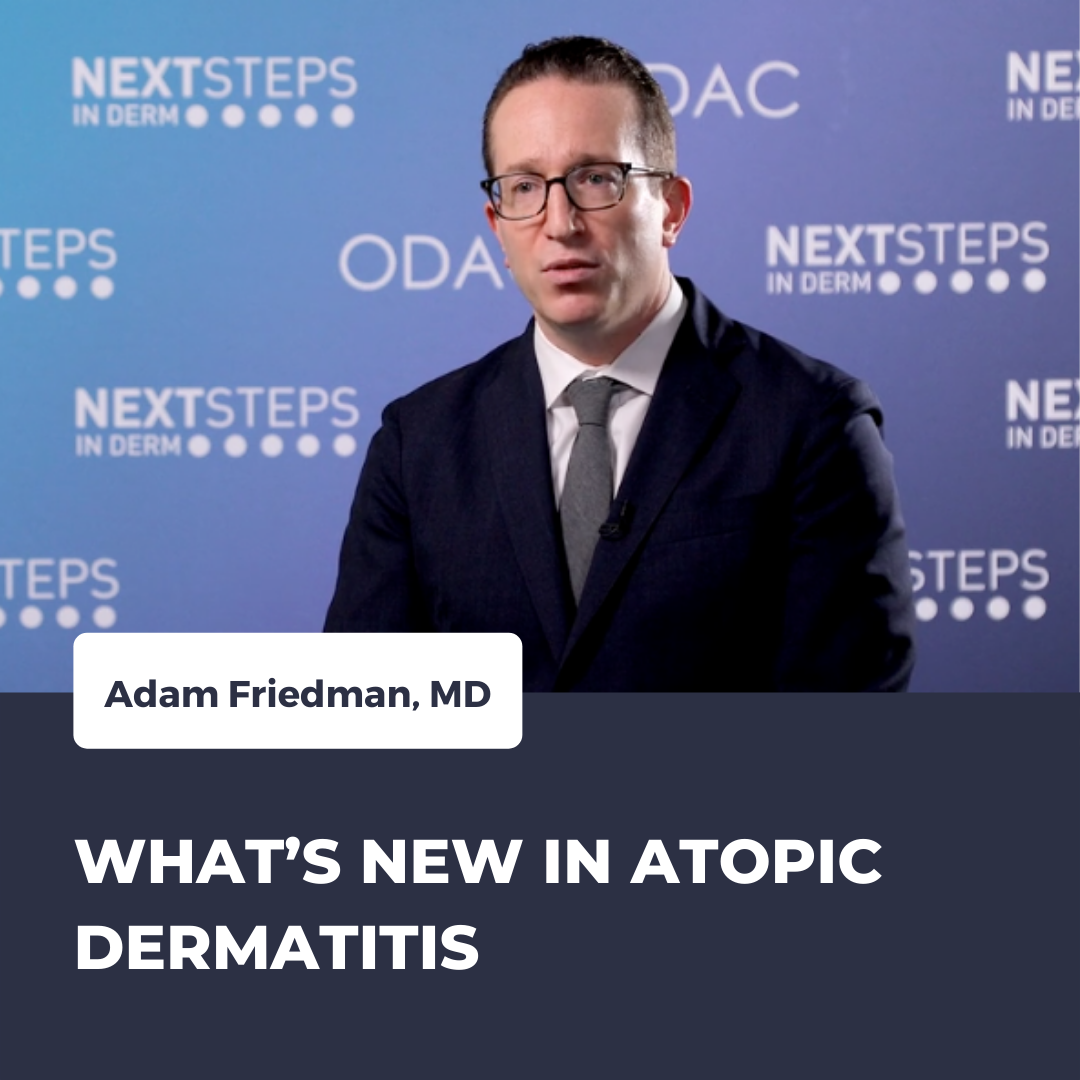Next Steps in Derm, in partnership with ODAC Dermatology, Aesthetic and Surgical Conference, interviewed Dr. Adam Friedman (Professor and Chair of Dermatology who serves as Associate Residency Program Director, Director of Translational Research, and Director of the Supportive Oncodermatology Program in the GW Department of Dermatology) about the latest in Atopic Dermatitis (AD). Watch as he discusses new drug approvals, a recent breakthrough that will open doors for patients seeking relief from this chronic skin condition.
Further Reading
If you would like to read more about Atopic Dermatitis, check out the following 3 articles recently published in the Journal of Drugs in Dermatology.
![]() The Heterogeneity of Atopic Dermatitis
The Heterogeneity of Atopic Dermatitis
Background: Recent advances were made in characterizing the clinical heterogeneity of atopic dermatitis (AD).
Objective: To review the clinical domains contributing to AD heterogeneity and describe their importance in clinical practice.
Methods: We conducted a focused review of the published literature, including retrospective, observational, and prospective studies, clinical trials, and consensus guidelines.
Results: AD is associated with heterogeneous skin manifestations, symptoms, lesional severity, lesional extent, longitudinal course, burden of signs and symptoms, and comorbidities. Each of these domains characterizes a different aspect of AD and should be used to guide overall severity assessment and clinical management. Primary focus on any one specific clinical domain of AD is insufficient to describe the full burden of disease.
Conclusion: Heterogeneity should be routinely considered during AD clinical encounters. Read the full article here.
Atopic dermatitis (AD) is a chronic skin condition affecting an increasing number of children and adults whose quality of life is impacted by chronic itch and pain. It is characterized by an altered epidermal barrier, skin inflammation, and skin microbiome dysbiosis particularly over-colonization of Staphylococcus aureus. The efficacy and tolerance of a cream containing a S. aureus-targeting technology (endolysin) was assessed in an open-label, two-week study in children and adults with mild-to-moderate atopic dermatitis. A total of 43 patients ranging from 7 months to 57 years old were included and all patients finished the study without any tolerance problem. Disease severity, measured with SCORAD, quickly reduced by 43% in 7 days and by 68 % in 14 days. The benefit was perceived by the whole panel with a marked improvement in overall QoL. This study shows the efficacy of a highly specific S. aureus-targeted technology in alleviating symptoms and improving QoL in children and adults with atopic dermatitis. It could also be beneficial in reducing and preventing flares in subjects with S. aureus load due to its good tolerance and specific action. Read the full article here
![]()
Patient-Reported Disease Burden and Unmet Therapeutic Needs in Atopic Dermatitis
Background: Atopic dermatitis (AD) is a common, chronic, relapsing, inflammatory skin disease causing a variety of dermatologic signs and symptoms, affecting patient’s quality of life. While treatment options are available, they are of variable effectiveness. This study sought to characterize patient-reported AD signs and symptoms, flare, and associated bother, by disease severity and control.
Methods: Adults diagnosed with AD were recruited through the National Eczema Association (NEA) and clinical sites and completed a web-based survey including the Patient-Oriented SCORing Atopic Dermatitis (PO-SCORAD), Recap of Atopic Eczema (RECAP), and Skin Pain numeric rating scale (NRS), as well as questions on previous/current clinical presentation, flare frequency and severity, past/ present AD treatment, and sociodemographic characteristics.
Results: A total of 186 participants completed the survey (mean age 39.7 years, 80% female). The most frequently reported current AD signs and symptoms included dryness, itch, redness, roughness, and flaking skin, and the most bothersome were itch, dryness, and redness (63%). The majority of participants (84%) were either currently experiencing a flare or had experienced one within the past month. The most common signs and symptoms that grew worse during the most recent flare were itch and redness across all disease severity groups. Participants most often experienced one to three flares in the last three months. Flare frequency, duration, and average severity increased with greater disease severity and lack of disease control.
Conclusions: The results of this study demonstrate the diverse and considerable symptomatic burden experienced by people with AD, even while being treated for AD. Read the full article here.
About Dr. Adam Friedman

Adam Friedman, MD, FAAD is Professor and Chair of Dermatology and serves as Associate Residency Program Director, Director of Translational Research, and Director of the Supportive Oncodermatology Program in the Department of Dermatology at The George Washington University School of Medicine & Health Sciences. Dr. Friedman has published over 225 papers/chapters and 3 textbooks on both his research as well as a variety of clinical areas in dermatology with an emphasis on emerging medical therapies and addressing gaps in inclusive education/care. Dr. Friedman is also committed to resident and medical education, serving as senior editor of the Dermatology In-Review, founding director of Krazy Kodachromes, the Oakstone Institute’s Dermatology Board Review and Dermatology for Primary Care series. He has received multiple awards such as the DermaCare Access Network Advocacy Leader Award, American Dermatologic Association Young Leader Award, the American Society for Dermatologic Surgery Cutting Edge Research Award, and the Journal of Drugs Innovations in Residency Teaching Award.
Did you enjoy these video pearls? Find more here.

